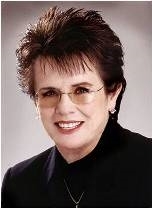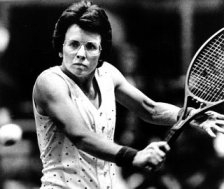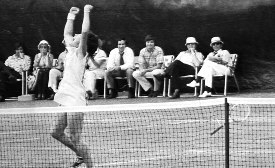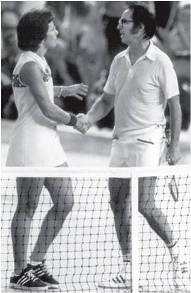 |
| (http://goldmedalgreats.com/wp-content/uploads/2011 ()) |
"The worst sin toward our fellow creatures is not to hate them, but to be indifferent to them: that's the essence of inhumanity." This quote from author George Bernard Shaw exemplifies the way women were treated decades ago. As a child, Billie Jean King took on the game of tennis, and instantly realized her potential at the sport. At the age of 14, she won her first tournament and later became a world class tennis player. Along the way, she encountered a roadblock she promised herself she would to change. People treated women differently simply because they were women. Throughout her tennis career, she founded organizations such as the Women's Tennis Association, Women's Sports Foundation, and the WTA in her attempt to improve the rights for women in sports and has made a significant impact throughout the world. Billie Jean King is a hero whose belief in equality, determination to make equality a reality, and bravery to stand up for equality inspires many people to peruse their goals.
 |
| (http://ball71.com/images/Billie-Jean-King.jpg () ()) |
Her passion to promote women's rights ignited at an early age. King claims "Ever since that day when I was 11 years old, and I wasn't allowed in a photo because I wasn't wearing a tennis skirt, I knew that I wanted to change the sport." (Billie Jean King) King's childhood memory demonstrates how she became aware of such a phenomenon at an early age. This did not discourage her. In fact, it did the opposite. It inspired her to make a change, which later led to accomplishments she would have never predicted of. Her tennis career was uneffected, and eventually became a professional tennis player. In the professional world, King became aware of even more differences between men and women. King "...was the first woman to earn $100,000 in a year as a professional tennis player. Rod Laver, the leading money winner on the men's tour, won $290,000 that year..." (Baughman) Society was indifferent enough to let differences like these pass, but King was not going to be part of them. Later in her career, she would realize how big of an impact she made, just because she believed in her cause. Having a belief is the first step to making a change as a hero, and King is a perfect role model of that.
 |
| (http://www.womenssportsfoundation.org/en/home/athl ()) |
King's determination on and off the court is an inspiration to everyone. She became a very successful professional tennis player. Throughout her career, ".King had logged 39 Grand Slam singles, doubles, and mixed doubles titles, including a record 20 at Wimbledon." ("Billie Jean King") Becoming a successful tennis player requires hard work, a bit of luck, a dash of talent, but most importantly, the determination to win. King's determination on the court led to 39 Grand Slam titles, were few people even get one in their lifetime. Much of the reason for her success in the fight for women's rights correlates to her success in her tennis career. King's determination on the court led to 39 Grand Slam titles, were few people even get one in their lifetime. King took the determination she had on the court and incorporated it into her fight for equality. King was a person of action, relentless when she wants to get something done. "In 1972 she complained loudly when she received only $10,000 for winning the U.S. Open, while male champion Ilie Nastase received $25,000...In 1973 King was instrumental in forming the Women's Tennis Association (WTA), a union established to lobby for women's rights on the professional tour." (Baughman) King saw something she could not accept, and set out to found an organization the very next year. The WTA was beneficial for her cause, and we still see how big of an impact it has today. The WTA is the international professional tennis organization that organizes tournaments and ranking for professional female tennis players. It is what holds together women's tennis today. King had a vision of how she wanted equality to be like, and was determined to make that a reality.
 |
| (Source: http://www.nytimes.com/packages/html/sport ()) |
King's career was not without obstacles and challenges, especially her path to fight for equality. She would object in areas no one has ever done before. "In 1973 King again won Wimbledon's singles and doubles championships. It was then that she began to openly criticize the scanty prize money offered to women competitors. She noted that women were receiving far less than men for what she considered equal ability and effort." ("Billie Jean King") At that time, women did not have much say in matters, so most of them stayed quite, indifferent. King had such a firm objection and it brought people's attention. It took bravery to speak up like that, but it is that bravery that made her such have such an impact. Perhaps one of her bravest deeds may be her most famous one. Her match with Bobby Riggs may have been the biggest turning point of her career. Prior to the match, Riggs had taken down Margret Court, a supporter of King's movement, in a match that would be known as the "Mother's Day Massacre". Riggs now wanted a shot at King herself, and this time, "...she knew she had to play Riggs to uphold the honor of the women's game she was fighting so hard to promote."(Ware 4) She had turned him down countless times before, believing there was no benefit to such a match. This time, there was everything to gain, and everything to lose. King knew how beneficial this win would be to her cause, and took the risk and played Riggs. King swept through with a win in the match we now know as "The Battle of the Sexes". Those two hours may have had a greater impact than the years she has been working on to fight for women's rights. Through her career, she did not back down from challenges, no matter how difficult they seemed, and did not let indifference get in the way.
King's belief in women's rights, combined with her determination and bravery, led to historic changes on the face of this world. Through her life, there were many obstacles in the way, trying to stop her. She would prove them wrong and build even more on her belief. All the work she was able to accomplish, considering the position she was in, is truly incredible. She gave up her own practice time to promote such a movement when she would have just kept training, and became an even more successful tennis player. But King promised to not be indifferent like everyone else. Many of the greatest horrors of mankind were because of hatred and violence. But the suffering would increase exponentially if people remain indifferent. Society needs to change and fight indifference, only then, will we in better world. Billie Jean King is a hero who overcame indifference and she would be honored as a hero for that.
Works Consulted
"Billie Jean King." Encyclopedia of World Biography. Detroit: Gale, 1998. Gale Biography In
Context. Web. 5 Dec. 2012.
"Billie Jean King Interview." Interview by Chris Widmaier. Tennis-X. N.p., 29 Aug. 2006. Web.
10 Dec. 2012.
Gould, Karen, and Gould Karen. "Billie Jean King." Great Lives From History: The Twentieth
Century (2008): 1. Biography Reference Center. Web. 5 Dec. 2012.
"King, Billie Jean 1943-." American Decades. Ed. Judith S. Baughman, et al. Vol. 8: 1970-1979.
Detroit: Gale, 2001.Gale Virtual Reference Library. Web. 6 Dec. 2012.
"The Womens Conference." Billie Jean King. Women's Sports Foundation, n.d. Web. 20 Dec.
2012.
Ware, Susan. Game, Set, Match: Billie Jean King and the Revolution in Women's Sports. Chapel
Hill: University of North Carolina, 2011. Print
"Women's Sports Foundation." Women's Sports Foundation. Women's Sports Foundation, n.d.
Page created on 1/10/2013 12:00:00 AM
Last edited 1/10/2013 12:00:00 AM
